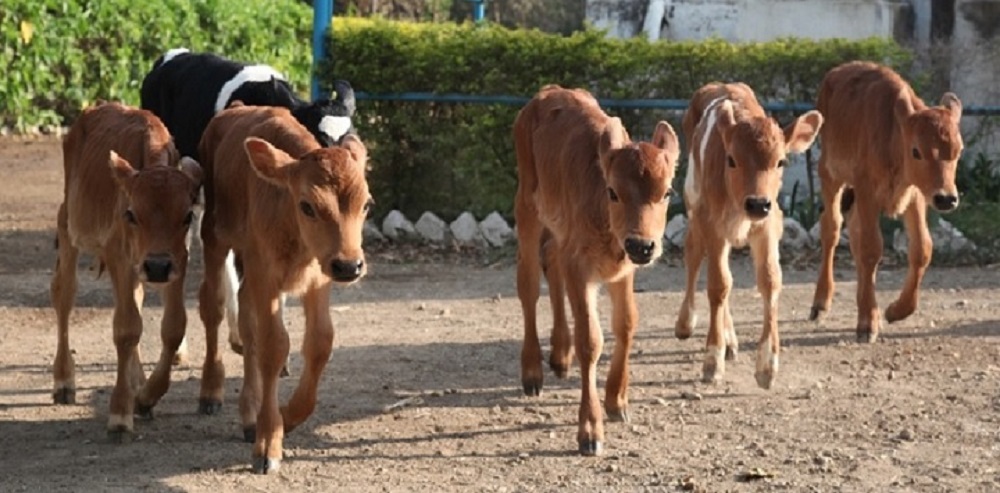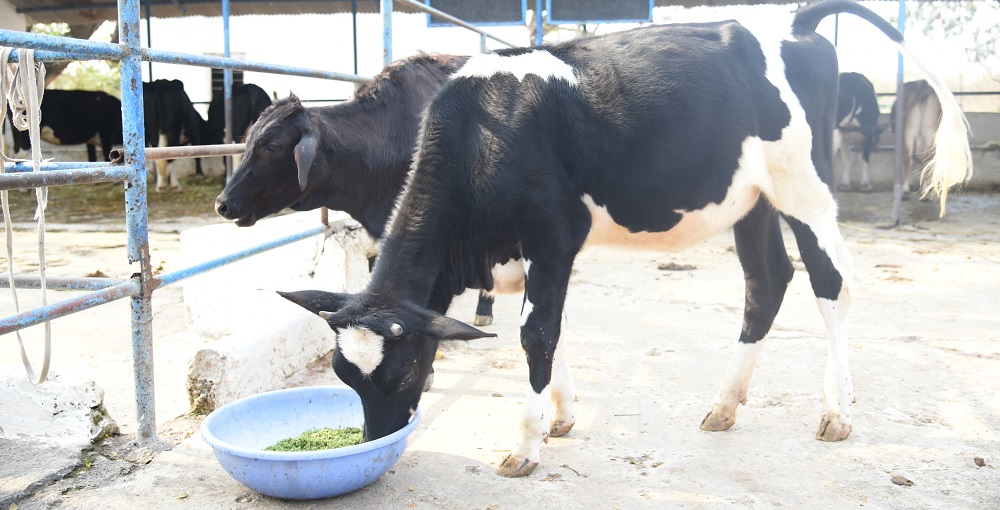
Global warming is a pressing global issue that has severe implications for the overall ecosystem. One significant contributor to this problem is the emission of methane from animals, which is influenced by various factors including feed type, feed intake, ambient temperature, rate of feed consumption, the balance of nutrients in the feed for microbial growth and microbial composition in the animal’s gut. To address this issue, a holistic livestock development approach can be adopted to improve the milk production and provide sustainable livelihoods for the rural community. Following strategies can be recommended and adopted to reduce the methane emission:
Improved animal nutrition and Ration Balancing Programme: Enhancing feeding practices and feed conversion efficiency is crucial in minimizing methane production. By increasing the energy content and digestibility of feed, less feed is converted to methane resulting in more productive output. Balanced diets incorporating high-quality forages can improve animal health, digestion, and ultimately reduce methane emissions. A balanced ration should provide protein, energy, minerals and vitamins from dry fodder, green fodder, concentrates, mineral supplements etc. in appropriate quantities to ensure optimal performance and animal health.

Use of anti-methanogenic feed supplements: Certain feed additives, such as tannins, essential oils, and enzyme supplements, have proven effective in reducing enteric methane emissions in livestock. With the help of research activities certain anti-methanogenic feed supplement have been developed which can be effectively and safely incorporated into animal diet like “Harit Dhara”. Based on the results of a feeding trial of Harit Dhara, anti-methanogenic feed supplement at different ICAR research institutes and possible reduction of methane emission up to 17 – 20%, BAIF has purchased a license of Harit Dhara for production and supply through its own programmes as well as from private customers. It has been developed from tannin-rich plant-based sources. Tropical plants containing tannins, bitter and astringent chemical compounds, are known to suppress or remove protozoa from the rumen. It decreases the population of protozoa microbes in the rumen, responsible for hydrogen production and making it available to the archaea (structure similar to bacteria) for reduction of CO2 eq. The use of Harit Dhara promotes higher milk production by increasing the production of propionic acid, providing more energy for lactose production and weight gain.

Changes in animal management and breeding: Improving animal productivity through selective breeding and enhanced management practices can significantly reduce methane emissions per unit of output. This approach requires a decrease in total animal numbers coupled with increased productivity to meet consumer demands.
Improved Breeding and genetics: Selective breeding programmes can be employed to develop dairy breeds that are more efficient in feed utilization and have lower methane emissions. Identifying and breeding animals with naturally low methane production can contribute to long-term emission reductions.
Use of sexed sorted semen: Sorted semen is a sexed semen containing either X or Y sperms and the use of it produces a desired sex (male or female) animal. The male calves are both neglected and under fed by the farmers due to less utility to the farmer. The sorted semen technology will produce 90% female calves. This technology helps to reduce the economic losses and challenges associated with male calves, leading to improved animal management.
Dung and Manure Management: Proper management of livestock waste, such as dung and manure, is crucial in reducing methane emissions. BAIF has contributed to research and development in establishing an Integrated Renewable Energy and Sustainable Agriculture (IRESA) Model-Based Biogas Unit. Pre-fabricated Floating Dome Biogas Plants are the first portable and ready-to-use plants. These Biogas Plants, made from non-toxic polyethylene material are free from any contamination, chemical resistant and blended with stabilizers, Anti Corrosive and Anti Acidic. These are designed especially for Semi Urban and Rural areas to produce biogas from wet waste and animal dung. This is easy for operation and cleaning. The generated biogas can be used for domestic purpose like cooking which is sufficient for a family of 5-6 members. Each unit can contribute 4 tons of CO2 equivalent emission reduction per year.

Furthermore, the digested slurry from the biogas unit can be utilized as organic fertilizer for crops or fish ponds. After continuous research and development, we have established a 5G filter technology developed to gain the benefits of this IRESA based Biogas Model. The 5G filter is used to separate the solid and liquid waste. The slurry separated water and LOF Culture can be used for kitchen garden plantation by drip irrigation. The application of organic manure improves soil quality by reducing salinity/alkalinity, increasing porosity and enhancing water-holding capacity. BAIF has obtained 2 patents jointly with Sankalp Med-Education Society, Pune viz. “Method and system for production of enriched organic fertilizer from biogas slurry separated water” for Liquid Organic Fertilizers (LOF) on 18th January, 2023 and “Method and system for separation of solids in biogas plant slurry for resource reutilization” for IRESA based Biogas Filter on 29th March, 2023.
Adopting a holistic livestock development approach that encompasses improved animal nutrition, anti-methanogenic feed supplements, changes in animal management and breeding, and effective dung and manure management can significantly reduce methane emissions. These strategies not only contribute to mitigating global warming but also improve milk production and provide sustainable livelihoods for rural communities.

Dr. Manojkumar Aware
Chief Thematic Programme Executive
Animal Nutrition & Climate Action
BAIF, CRS, Uruli Kanchan, Pune

Extremely Important Innovation For Farmers.Productive result oriented.Helpful to reduce digestive issues.
Yes. These interventions like Harit Dhara not only reduce the methane emission but also improve the digestion. It improves the productivity as well. Other interventions like Sex Sorted Semen will enhance the genetic potential of the animals. IRESA Biogas and BioPROM will also ensure the sustainable agriculture.
very great work BAIF doing, hats off